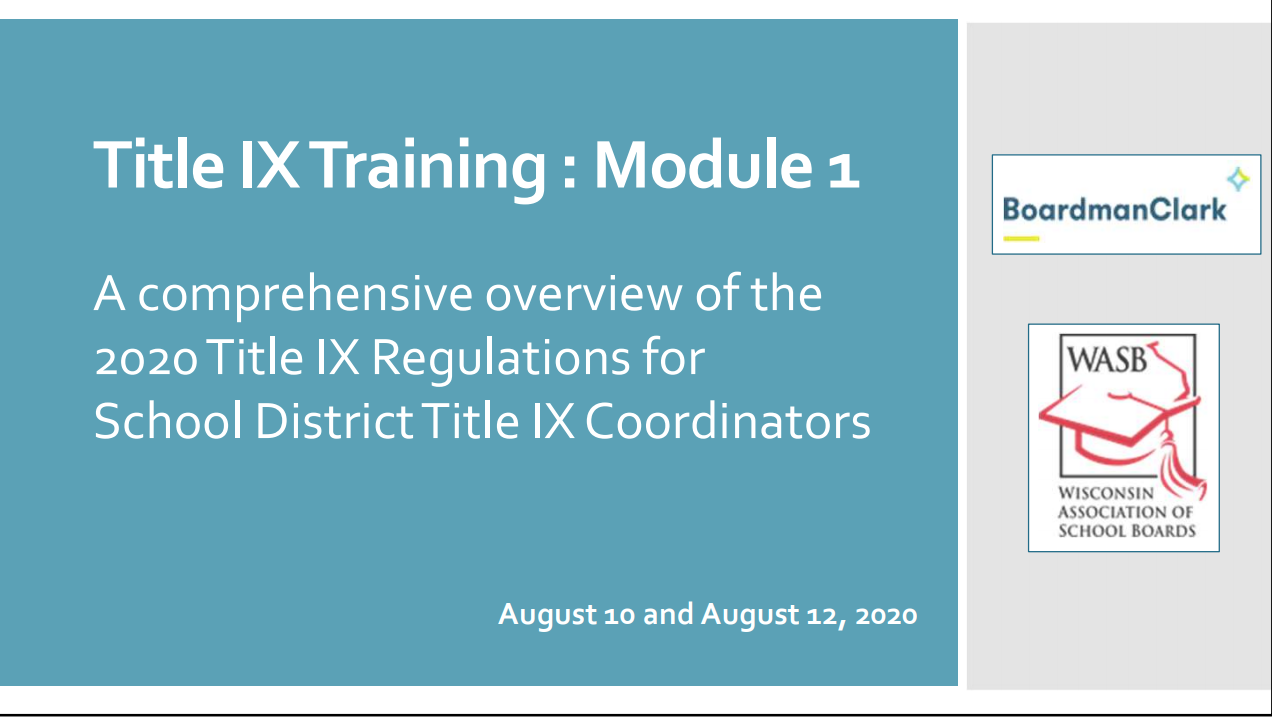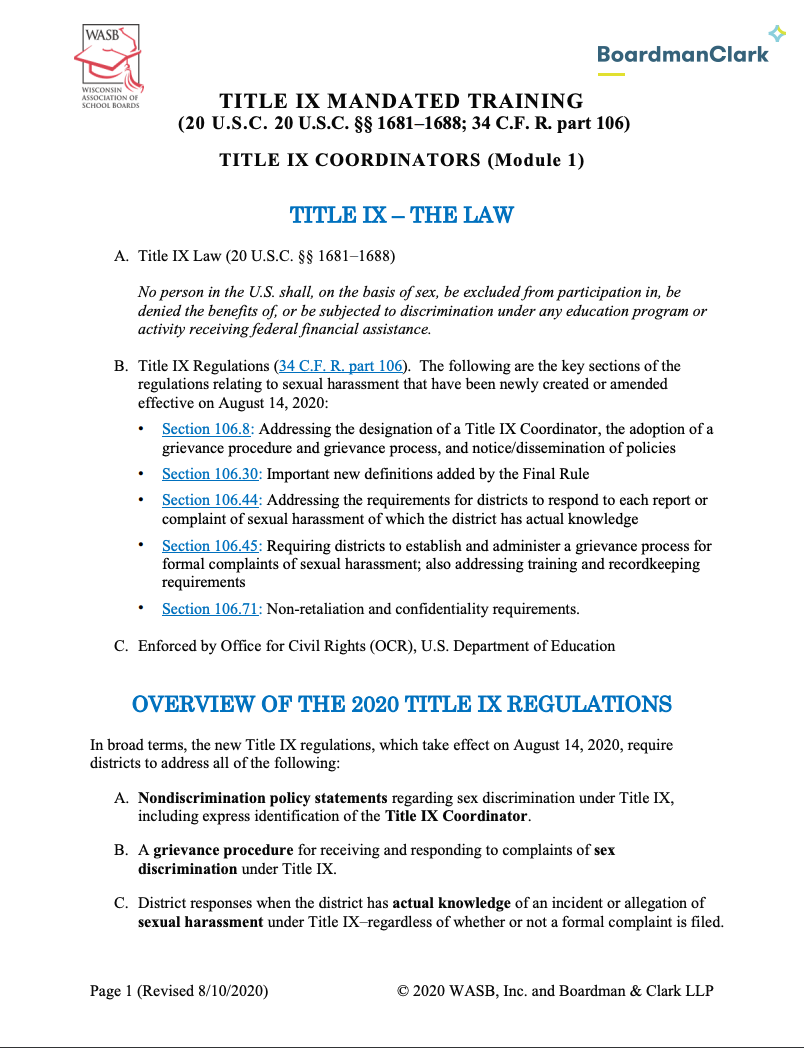DISTRICT TRAINING MODULES
The Board of the New Lisbon School District does not discriminate on the basis of sex in its education program or activity and is required by Title IX and implementing regulations not to discriminate in such a manner. The requirement not to discriminate in its education program or activity extends to admission and employment. Any inquiries about the application of Title IX and its implementing regulations to the District may be referred to the Title IX Coordinator(s), the Assistant Secretary for the U.S. Department of Education’s Office for Civil Rights, or both.
The Board has adopted a grievance process that provides for the prompt and equitable resolution of student and employee complaints alleging any action that is prohibited by Title IX and/or its implementing regulations. The grievance process is included in Policy 2260 – Nondiscrimination on the Basis of Sex in Education Programs or Activities, which is available at: NEOLA Policies. The grievance process specifically addresses how to report or file a complaint of sex discrimination, how to report or file a formal complaint of Sexual Harassment, and how the District will respond.
TITLE IX TRAINING SLIDESHOW
TITLE IX TRAINING MANDATE
Title VI and Title IX Discrimination: "Dear Colleague" letter (September 13, 2004) addressing the right of all students, including students of faith, to be free from discrimination in our schools and colleges under Title VI of the Civil Rights Act of 1964 and IX of the Education Amendments Act of 1972, in cases where such discrimination may be commingled with religious discrimination.
Title IX Responsibilities: "Dear Colleague" letter (August 4, 2004) reminding postsecondary institutions of Title IX responsibilities.
Title IX Responsibilities: "Dear Colleague" letter (April 26, 2004) reminding chief state school officers and state and local education agencies that the Title IX regulations require recipients to designate a Title IX coordinator, adopt and disseminate a nondiscrimination policy, and put grievance procedures in place to address complaints of discrimination on the basis of sex in educational programs and activities.
Title IX

NOTICE OF SCHOOL DISTRICT POLICIES ON SEX DISCRIMINATION, THE DISTRICT’S TITLE IX COORDINATOR(S), AND PROCEDURES FOR REPORTING OR FILING A COMPLAINT OF SEX DISCRIMINATION
As mandated by the current provisions of Title IX of the Education Amendments of 1972 and under the regulations set forth in Chapter 106 of Title 34 of the Code of Federal Regulations (“the federal Title IX regulations”), the District does not unlawfully discriminate on the basis of sex in any education program or activity that the District operates. Title IX’s requirement not to discriminate in any education program or activity extends to cover, but is not limited to, District students, certain admissions processes, and District employment. Inquiries regarding how Title IX and the federal Title IX regulations apply to the District may be referred to a District Title IX Coordinator (as designated below), to the Assistant Secretary for Civil Rights at the U.S. Department of Education, or to both.
The District’s commitment to nondiscrimination under Title IX and under other state and federal laws is further defined in the following policies of the School Board: Policy #2260
New Lisbon School District Title IX Coordinators
The District employees who hold each of the positions identified below serve as Title IX Coordinators for the District:
JH/HS Guidance Counselor | |
|---|---|
Elementary Guidance Counselor |
The names, titles, and contact information of these individuals will be published annually in the staff and student handbooks and on the School District's website.
A CO will be available during regular school/work hours to discuss concerns related to student discrimination in educational opportunities under this policy.
Reporting Sex Discrimination
Any person (including a person who is not claiming to have been personally harmed/victimized by the alleged discrimination) may report a concern or allegation regarding prohibited sex discrimination (including sexual harassment) to the District. Such reports may be submitted as follows:
To a District Title IX Coordinator, either in person, by U.S. mail, by telephone, or by electronic mail, using the contact information listed above. In person reports should be made when the Title IX Coordinator is reasonably available during regular working hours. Reports submitted by telephone, mail, or electronic mail may be made at any time.
By any other means that results in a Title IX Coordinator actually receiving the person's verbal or written report.
Filing Formal Complaints of Title IX Sexual Harassment
As required by the federal Title IX regulations, the District has established a formal grievance process for investigating and resolving “formal complaints” of “sexual harassment,” as those terms are defined in the regulations.
An individual who is alleged to be the victim of conduct that could constitute sexual harassment under the federal Title IX regulations (i.e., a Title IX “complainant”), or a parent or guardian who has a legal right to act on behalf of such an individual, may file a formal complaint of sexual harassment. No Title IX complainant is obligated to file a formal complaint, but a qualifying formal complaint is necessary for the District to start an investigation using the District’s formal Title IX grievance process.
Complainants are expected to file formal complaints of sexual harassment with a District Title IX Coordinator by submitting a document or electronic submission in person, by U.S. mail, or by electronic mail, using the contact information specified above.
Additional requirements for formal complaints of Title IX sexual harassment, including a description of the required content for a formal complaint, are set forth in Policy #2260.
Investigation and Complaint Procedure
The CO shall investigate any complaints brought under this policy. Throughout the course of the process, as described herein, the CO should keep the parties informed of the status of the investigation and the decision-making process.
All complaints must include the following information to the extent it is available: a description of the alleged violation, the identity of the individual(s) believed to have engaged in or to be actively engaging in, conduct in violation of this policy if any; a detailed description of the facts upon which the complaint is based; and a list of potential witnesses.
If the Complainant is unwilling or unable to provide a written statement including the information set forth above, the CO shall ask for such details in an oral interview. Thereafter the CO will prepare a written summary of the oral interview, and the Complainant will be asked to verify the accuracy of the report by signing the document.
Upon receiving a complaint, the CO will consider whether any action should be taken during the investigatory phase to protect the Complainant from further loss of educational opportunity, including but not limited to a change of class schedule for the Complainant, tentative enrollment in a program, or other appropriate action. The Complainant should be notified of any proposed action prior to such action being taken.
As soon as appropriate in the investigation process, the CO will inform any individual named by the Complainant in connection with an alleged violation of this policy, that a complaint has been received. The person(s) must also be provided an opportunity to respond to the complaint.
All investigations shall be commenced as soon as practicable upon receipt of a complaint and concluded as expeditiously as feasible, in consideration of the circumstances, while taking measures to complete a thorough investigation. The complaining party shall be notified in writing of receipt of the complaint within forty-five (45) days of the complaint and shall reach a determination concerning the complaint within ninety (90) days of receipt, unless additional time is agreed to by the complaining party.
The investigation will include:
interviews with the Complainant;
interviews with any persons named in the complaint;
interviews with any other witnesses who may reasonably be expected to have any information relevant to the allegations, as determined by the CO;
consideration of any documentation or other evidence presented by the Complainant, Respondent, or any other witness which is reasonably believed to be relevant to the allegations, as determined by the CO.
At the conclusion of the investigation, the CO shall prepare and deliver a written report to the District Administrator which summarizes the evidence gathered during the investigation and provides recommendations based on the evidence and the definitions in this Policy, as well as in State and Federal law as to whether the Complainant has been denied access to educational opportunities on the basis of one (1) of the protected classifications, based on a preponderance of evidence standard. The CO’s recommendations must be based upon the totality of the circumstances, including the ages and maturity levels of those involved.
The CO may consult with the Board Attorney before finalizing the report to the District Administrator.
Absent extenuating circumstances, within ten (10) business days of receiving the report of the CO, the District Administrator must either issue a final decision regarding the complaint or request further investigation. A copy of the District Administrator's final decision will be delivered to the Complainant. The District Administrator may redact information from the decision in the event the release of information raises concerns regarding the integrity of the complaint or investigation process. The Board authorizes the District Administrator to consult with legal counsel to determine the extent to which information in an investigation report must be provided to either the Complainant or Respondent.
If the District Administrator requests additional investigation, the District Administrator must specify the additional information that is to be gathered, and such additional investigation must be completed within ten (10) business days. At the conclusion of the additional investigation, the District Administrator must issue a final written decision as described above. The decision of the District Administrator will be reviewed by the Board upon request.
Any person, including the Respondent in a complaint, who is subject to disciplinary action up to and including termination as a result of a complaint may choose to file a Grievance utilizing the District's grievance procedure as outlined in Policy 3430 or Policy 4430.
If the Complainant feels that the decision does not adequately address the complaint s/he may appeal the decision to the State Superintendent of Public Instruction by submitting a written request to the Wisconsin Department of Public Instruction, Pupil Nondiscrimination Program, or by contacting the DPI Pupil Nondiscrimination Program at (608) 267-9157.
The Board reserves the right to investigate and resolve a complaint or report of regardless of whether the member of the School District community or third party chooses to pursue the complaint. The Board also reserves the right to have the complaint investigation conducted by an external person in accordance with this policy or in such other manner as deemed appropriate by the Board.
District Response to Reports and Complaints of Sex Discrimination and to Formal Complaints of Sexual Harassment Under Title IX
The District has established grievance procedures through which the District structures its response to reports that allege unlawful discrimination on the basis of sex in any education program or activity of the District. Those procedures are set forth in Policy #2260. The purpose of such procedures is to provide for the prompt and equitable resolution of any report or complaint of alleged sex discrimination, excluding formal complaints of sexual harassment under Title IX (which are subject to a different process).
Any time that the District has actual knowledge of sexual harassment or allegations of sexual harassment that could constitute a violation of Title IX, the District has obligations to respond to such knowledge in a manner that is not deliberately indifferent and in a manner that treats the alleged victim(s) of sexual harassment and the alleged perpetrator(s) of sexual harassment equitably. Such a response includes, but is not limited to, offering supportive measures to a complainant and investigating and resolving any formal complaint that presents allegations of Title IX sexual harassment using the formal grievance process that the District has adopted for such formal complaints. District procedures for responding to alleged sexual harassment under Title IX, including the formal grievance process, are set forth in Policy #2260.
Additional School District Action
If the evidence suggests that any conduct at issue violates any other policies of the Board, is a crime or requires mandatory reporting under the Children's Code (Sec. 48.981, Wis. Stat.) (Policy 8462), or threats of violence (Policy 8462.01), the CO or District Administrator shall take such additional actions as necessary and appropriate under the circumstances, which may include a report to the appropriate social service and/or law enforcement agency charged with responsibility for handling such investigations.
Confidentiality
The District will make reasonable efforts to protect the privacy of any individuals involved in the investigation process. Confidentiality cannot be guaranteed, however. All Complainants proceeding through the investigation process should be advised that as a result of the investigation, allegations against individuals may become known to those individuals, including the Complainant’s identity.
During the course of an investigation, the CO will instruct all members of the School District community and third parties who are interviewed about the importance of maintaining confidentiality. Any individual who is interviewed as part of an investigation is expected not to disclose any information that s/he learns or that s/he provides during the course of the investigation.
Retention of Investigatory Records and Materials
All individuals charged with conducting investigations under this policy shall retain all information, documents, electronically stored information ("ESI"), and electronic media (as defined in Policy 8315) created and received as part of an investigation, including, but not limited to:
all written reports/allegations/complaints/statements;
narratives of all verbal reports, allegations, complaints, and statements collected;
a narrative of all actions taken by District personnel;
any written documentation of actions taken by District personnel;
narratives of, notes from, or audio, video, or digital recordings of witness statements;
all documentary evidence;
e-mails, texts, or social media posts pertaining to the investigation;
contemporaneous notes in whatever form made (e.g., handwritten, keyed into a computer or tablet, etc.) pertaining to the investigation;
written disciplinary sanctions issued to students or employees and a narrative of verbal disciplinary sanctions issued to students or employees for violations of the policies and procedures prohibiting discrimination or harassment;
dated written determinations to the parties;
dated written descriptions of verbal notifications to the parties;
written documentation of any interim measures offered and/or provided to Complainants, including no contact orders issued to both parties, the dates issued, and the dates the parties acknowledged receipt; and
documentation of all actions taken, both individual and systemic, to stop the discrimination or harassment, prevent its recurrence, eliminate any hostile environment, and remedy its discriminatory effects.
The information, documents, ESI, and electronic media (as defined in Policy 8315) retained may include public records and records exempt from disclosure under Federal and/or State law (e.g., student records).
The information, documents, ESI, and electronic media (as defined in Policy 8315) created or received as part of an investigation shall be retained in accordance with Policy 8310, Policy 8315, Policy 8320, and Policy 8330 for not less than three (3) years, but longer if required by the District's records retention schedule.
Revised 5/13/13
Revised 11/10/14
Revised 7/9/2018
Revised 11/11/19
© Neola 2020
Legal
118.13 Wis. Stats.
P.I. 9, Wis. Adm. Code
P.I. 41, Wis. Adm. Code
Fourteenth Amendment, U.S. Constitution
20 U.S.C. Section 1681, Title IX of Education Amendments Act
20 U.S.C. Section 1701 et seq., Equal Educational Opportunities Act of 1974
20 U.S.C. Section 7905, Boy Scouts of America Equal Access Act
29 U.S.C. Section 794, Rehabilitation Act of 1973, as amended
42 U.S.C. Section 2000 et seq., Civil Rights Act of 1964
42 U.S.C. Section 2000ff et seq., The Genetic Information Nondiscrimination Act
42 U.S.C. 6101 et seq., Age Discrimination Act of 1975
42 U.S.C. 12101 et seq., The Americans with Disabilities Act of 1990, as amended


